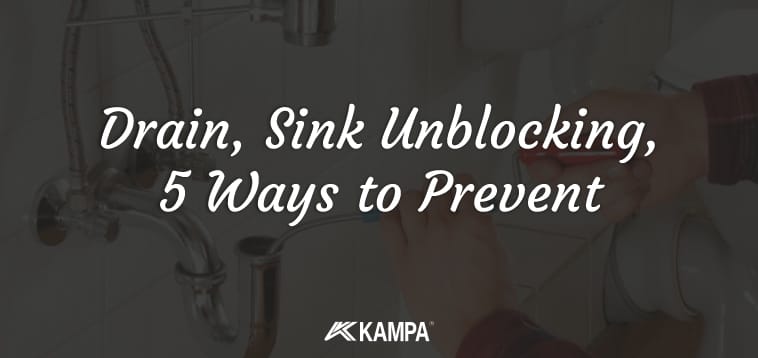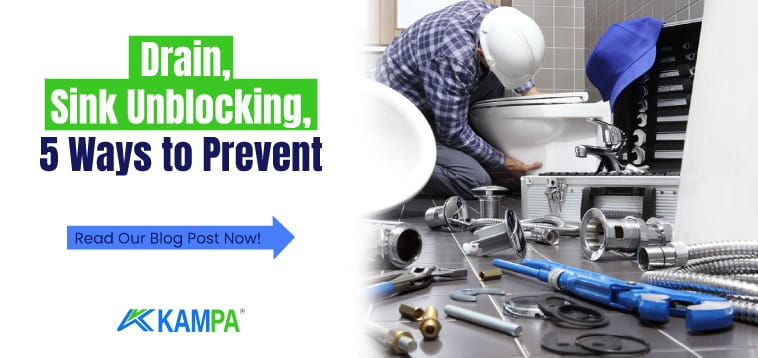Drain, Sink Unblocking, 5 Ways to Prevent
Welcome to our article where we will talk about drain, sink unblocking, how to open it. If you are a restaurant or a business owner, I strongly recommend you to read this blog.
Imagine how frightening the reactions you will get from kitchen staff and customers if there is a problem in the plumbing of your business.
Be careful to apply the following 5 tricks to prevent plumbing crisis, sink blockages and how to unclog the sink.
You May Face Failure at Any Time, Address All Installation Risks in Advance.
When was the last time you conducted a risk assessment on expenses? And have you recognized and repaired the risks?
The answer to these questions is usually “no“. I’m sorry I have to say this, the plumbing system is a potential threat to your facility, to your customers, to your employees.
Risk factors in installations that cause sink blockages are usually;
- Oil waste
- Unfiltered drains
- Old, worn pipes
- Incorrectly sized and curved pipeline
- It comes in the form of shredder damages or shredderless expenses.
I recommend that you contact a plumber to carry out a risk assessment of your property and to unblock your sink. The plumbers will examine your drains and inform you about possible risks.
Start by Cleaning Highly Clogged Drains.
Toilets and kitchens are the main problem areas. For the sink unclogging process, start by first checking the toilet drains.
WC, Bathroom, Septic Drains

The most common cause of flooding in facilities is blocked drains. Clogged drains don’t just affect the kitchen team.
Blockages can cause bacteria-laden wastewater to seep onto the floor throughout your facility. Flooding can damage furniture, flooring, equipment.
The main causes of sewer drain blockage are as follows.
- Solid waste thrown down the sink. Napkins, sanitary napkins, diapers, etc.
- Grease and septic tank accumulation in the sewer
- Weather-related flooding
- Septic pump failures
Drain and waste water areas should be kept as dry as possible. Damp floors can cause insect infestation and mold. In order to prevent these problems from occurring, it is absolutely necessary to use a drainage submersible pump.
Especially for cesspool wastes and solid wastes (diapers, napkins, hygienic feminine products…) septic tank drainage submersible pumps with shredders should be used.
Click to buy a septic tank drainage submersible pump.
Kitchen, Waste Water Drain, Sink Unblocking

The most obvious cause of clogged kitchen drains is grease accumulation in the drains. If the drain pipes are not cleaned regularly, possible drain and sink blockages can be expected.
We recommend that you make your kitchen staff aware of the following issues.
- How should drainage cleaning be done?
- How should dishwashing and grease waste be disposed of?
- Which fats can cause blockages?
- How can solid particulate aqueous wastes that cause drain and sink unblocking be prevented?
When you instill this knowledge in the staff working in your business, you will see that your expenses are healthier and longer lasting. Your staff will be more careful and more cautious.
- Always install filters in the sink drains.
- Do not pour oil waste down the sink drain. Waste oils left in the sink drain will both damage your installation and cause environmental pollution.
- You can collect waste oil and deliver it to waste oil collection centers.
- Pay attention to cleaning the drains. Always clean your drains with baking soda and hot water every day. This formula will prevent possible drain and sink blockages and unclog them if there is a blockage.
- Use submersible pumps with grinder.
Create Plumbing Emergency Guidelines.
For drain and sink unblocking, business employees trained in emergency interventions remain calmer in plumbing emergencies.
Employees do not waste time because they know in advance what to do next or who to contact when water is rising on the ground.
- Select the staff to be deployed.
- Make a list of people or institutions you trust for plumbing.
- Assign a separate task to your team by listing what needs to be done in emergencies. For example, will the dishes not be washed because the kitchen drain is blocked?
- Planning where and by whom and how these dishes will be washed ensures that your business can continue without a crisis in emergency situations.
Solving Plumbing Problems
Some installation problems can be solved while the business is still operating, but others need to be solved during the downtime.
Problems Requiring Business Closure
If the sink drain blockage, sewer blockage or flooding water is close to the food storage and kitchen area, you should definitely close your business temporarily.
Flood water creates bacteria, food can rot. Diseases caused by fecal waste, contaminated water and chemicals are more likely to occur.
Flooded floors can lead to electrocution, slips, falls and even drowning if the water is high enough.
Anyway, considering the corporate image and reputation, how right would it be to leave the business open in such a situation, right?

Installation Problems that Do Not Require Business Closure
If a clogged drain or other problem can be easily fixed and it is limited to a small area, your business can stay open. However, we cannot say with certainty which plumbing problem will lead to a major plumbing crisis.
A blocked toilet or bathroom sink can flood your dining area. A burst pipe may only spray a little water at first, but then the force of the spray will break the pipe even further, causing a large flow.
When creating a plumbing crisis list, try to think of all possible scenarios. Make sure to give simple and clear instructions on how to deal with it.
- Leaking pipes,
- Supply and discharge pipes with high probability of explosion
- Leaky faucets,
- Clogged sinks and toilets,
- Water seeping in from outside is a major potential threat.
Perform Periodic Checks for Drain Sink Unblocking

In order to prevent clogging of kitchen, bathroom and WC drains and to deal with rainwater outside, the enterprise must have a healthy drainage system. Possible crises can be minimized with the necessary equipment and measures.
For drainage discharge, wastewater must be transferred through the installation line without any problems. Drain blockage that may occur in the pipes is the main source of malfunctions.
- Inspect your installation every 3 months. Repair any possible damage.
- Have it serviced every 12 months. Have plumbing pipes overhauled, drains cleaned, drainage pumps serviced by authorized services.
- Implement emergency guidelines and notify new staff when there is a change of personnel.
- Keep in touch with plumbers you can always call. Remember, plumbers will be the first aid service for your plumbing in case of emergency.
- Make sure of the quality of the drainage pumps. Know if they are suitable for your location.
I hope this has been a useful blog for you on drain and sink unclogging and prevention. You can share your experiences and suggestions by commenting.
Learn more about submersible pumps. Please visit our Kampa Company website to buy.


